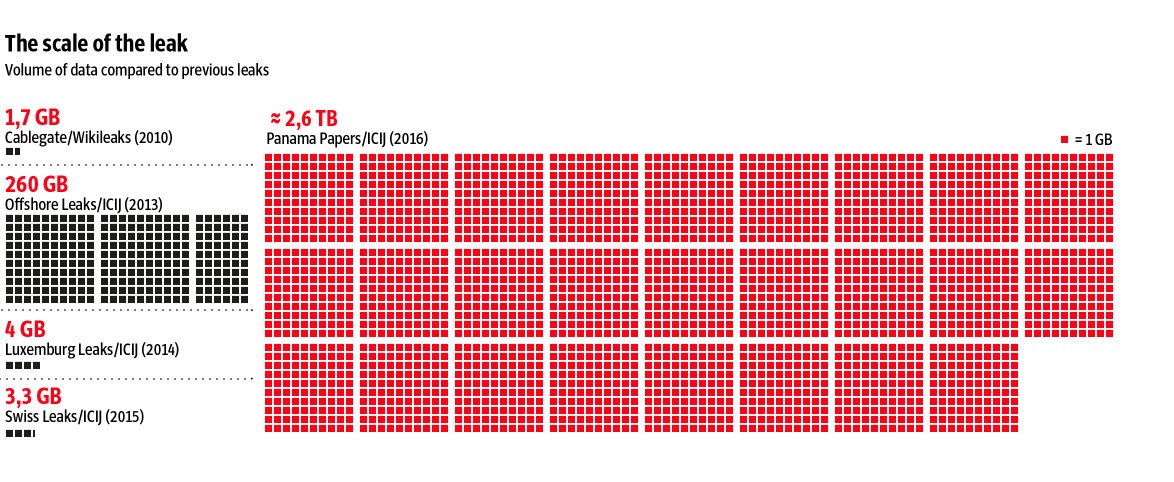Yesterday I had the chance to attend News Impact Summit at the London School of Economics. The theme this year was Trolls, Corruption, Falsehood: Reporting ‘Truth’ in the Digital Age. It was really a wonderful event, and after attending (too!) many tech events & meetups, it’s also refreshing to attend a slightly different event and to talk about how technology can affect politics or public policy.
Here is a summary of some of the talks I found very interesting.
Panama Papers
There were a couple of talks about the Panama Papers. The scale of the leak is unprecedented – if you thought WikiLeaks or the Swiss Leaks were huge, think again. This infographic puts things into perspective.
 So how do you deal with 11.5M documents?
So how do you deal with 11.5M documents?
There is no doubt that it’s technologically challenging. Someone suggested it would take one person 20 years to read all the documents. The only solution was to collaborate: this investigation has been a great illustration of how media organisations have been able to collaborate, not only with each other, but also internally within their organisation.
Working through 11.5M papers is like trying to get sweets out of a giant piñata. You have to hit with multiple sticks from different angles. 370 journalists worked on this investigation, trying to make sense of the data. Just to put things into context, there are over 200K names in the database. Journalists ran leaked names against lists of MPs, lists of property owners, rich lists, etc.
An offshore leaks database was built, where you can search officers, intermediaries, entities and addresses. Every name/address is turned into nodes.
But how secure is the data? The tech used by the different media organisations was discussed during the Q&A. Because they realized that governments and agencies were not necessarily “after” the data (especially if you compare it to the Snowden leak), they decided to host the data on the cloud (AWS). They used a combination of open source platforms on which they added extra security layers (eg two step authentication). Security was a struggle as not all journalists are tech-savvy: getting them to use PGP was a challenge.
In some countries, the government, the police, tax agencies are requesting access to the data but the ICIJ mentioned that they will not hand over the documents.
Politics, Propaganda and Bots: the changing nature of cyber warfare
This was a really fascinating talk about bots, especially because I had never fully realized the impact of bots on politics.
So why do you create bots in the first place? For three reasons, called the 3 P’s – profit, public interest & power.
Bots are very pervasive, can tweet millions of times a day, don’t have temporal restraints: they are tireless and yet you need social capital, money & time for real political change.
There are bots out there that are used by government or the military just to interrupt the conversation (eg in Syria). Now we have bots that are developed with machine learning techniques and can actually talk and answer people.
One thing that was mentioned in the panel is that when an activist is detained, they’re usually beaten until they give up their social media passwords. Accounts are then hijacked to propagate information as it’s easier to break into influencers’ social media accounts than build followings from scratch.
What we’re seeing right now is using a combination of cyber army of people (eg in Russia) and bots. This is what a panelist called “semi-human”. For example, bots can contact millions of people and, if people respond, a human takes over to engage in conversation.
A common tactic for bots who want to take over journalists’ accounts is to use conference invitations: bots will invite the journalist for a conference (with airfare, food, accommodation included) and by clicking on it, the journalist can get hacked.
It will be interesting to see what happens to bots in the future – if platforms evolve and get smarter, or if politicians are taking advantage of this trend. Half of Trump and Clinton’s followers on Twitter are bots…politicians are now using bots to do micro targetting of accounts.
Fireside Chat: Trolls and Russian Propaganda
This was a really great talk but also one of the scariest of the day.
Jessikka Aro, a Finnish journalist, talked about her experience with trolls. She started her investigation of Russian trolls in 2014 and quickly became a target herself. Some trolls have gone really far, impersonating her father, who died 20+ years ago.
She reminds herself that attacks are not personal, it is against her work to get her to be silent. When she visited a troll factory in Russia, people were terrified to see a Finnish journalist there asking questions.
One thing she does to cope with the trolling is to dissociate herself from her online ‘persona’.
You can read more about her story here and here.
There were a lot of interesting talks about VR, fact checking (do check Full Fact, a fact checking charity) or online harassment. I for example learned that almost 1M comments are being reported to FB daily. A lot of people think this is done automatically via algorithms – but it’s not. Real humans are deciding the “fate” of the comments once it’s reported. I wonder how scalable this is. Most websites have teams that moderate – you can check this very interesting article that the Guardian wrote about the dark side of comments a month ago. And if you don’t moderate your comments as a public-facing company/website, what does this say about you?
This summit gave me lots to think about. Thanks Google, Polis@LSE & EJC for putting it together. Until next time!